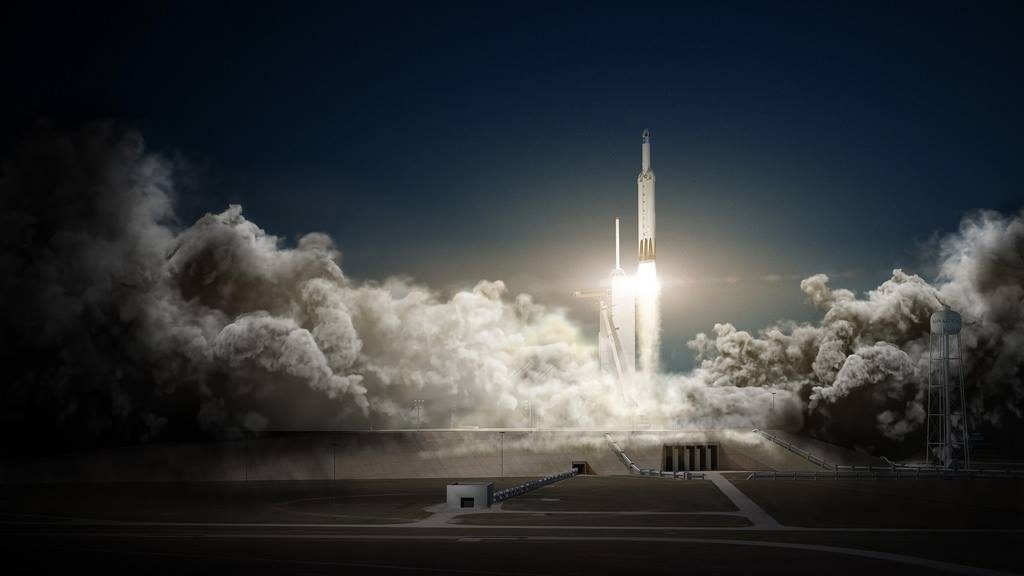Elon Musk and the Bourgeois Space Adventure
This week saw the launch of the world’s most powerful rocket – Falcon Heavy – into space, which is owned and operated by Elon Musk’s private space exploration company SpaceX. The eccentric billionaire’s wealth was seeded by his early involvement in PayPal, and now boasts a network of innovative projects often designed to improve life on Earth. Projects include the electric car company Tesla, and Hyperloop which hopes to provide relatively low cost, extremely fast land-based travel between cities.
I watched the launch live with my family around our TV, fascinated by his desire to throw one of his electric Tesla cars into orbit around the sun. The launch was a test to confirm the viability of Falcon Heavy to carry heavy loads into orbit around Earth, but Musk skillfully turned it into a massively hyped up car advert for his own company. Of course one can say that his projects work towards the greater good in that they could displace demand for fossil fuels, but via SpaceX he is promoting the idea that we can jump ship and move civilisation to Mars, which inevitably creates the ideological space to give up on demanding a habitable planet here.

Falcon Heavy is a masterpiece of engineering. It can lift the equivalent weight of five double decker London buses into orbit, without putting direct strain on the public purse as NASA’s now shelved Space Shuttle program did. Elon’s rockets, and I keep using his name because the success of securing investment in the projects is significantly due to the cult of personality surrounding him, are capable of landing automatically back on Earth instead of burning up in the atmosphere. Crucially, this enables reuse of the rockets which is far cheaper and more environmentally sound.
I believe that space exploration is a good thing and something to be encouraged, including via taxpayer funding and international laws designed to ensure responsible operations. Sending sensors and people up away from Earth enables us to think beyond ourselves. It helps us realise the possibility that we are not alone in the universe, and that we should be able to go and experience the vastness of space and wonders of alien environments for ourselves. Funding space exploration also accelerates the development of innovations which are useful beyond aerospace engineering. A good example of this is the fact that laptops were invented for use on NASA’s Space Shuttle, as a relatively compact means of using a computer.
Neoliberal capitalists and some right wing libertarians say that SpaceX’s recent success shows that innovation is best left to the private sector. Why should the taxpayer foot the bill for such extravagances as self-landing rocket boosters when homelessness and hunger still haven’t been eliminated? Under Russian communism, people put the satellite Sputnik into space. That was entirely driven by public money, and in tandem with the US’s governments similar ventures into space, international public cooperation has meant we have a permanent habitat for people in space called the International Space Station.
The editor of City AM – London’s newspaper aimed at workers in the financial district, commented that Elon will need to turn a profit if he is to continue receiving support from investors. SpaceX hasn’t yet fully rolled out it’s money making operations, and some are suggesting his rockets are best placed to assist the US military in their spacefaring operations. Putting military satellites into orbit is a lot less fluffy than sending up an electric car blaring David Bowie into the void. He’s also blissfully free of the democratic oversight which was present for NASA. Another means of making money would be resource extraction by doing things like mining asteroids. All these things raise serious ethical questions for how we wish to explore beyond our home planet.
By giving validity to the idea that we can simply move planet because we’ve screwed this one up so much, we ignore the fact that, for the vast majority of people on Earth, space travel is never going to be an option. This raises questions about inequality, as was partially explored by the science-fiction film Elysium where the elite inhabit a luxurious satellite in orbit. If space exploration isn’t based on genuinely expanding our collective knowledge and creating opportunities for expanded human well-being, it will be left wide open to capitalists to simply exploit another resource for them and their friends.



This is a typically biased and absolutist argument that makes no sense whatsoever. Quite simply, just because we will soon have the means to leave our planet and live on others, doesn’t mean that we should, or that we can abrogate our responsibilities to the planet we were born on. We can do all of these things. This commentator, along with others from across the political spectrum, are shamelessly using this story (and many others) for short-term political gain and confusing the facts.